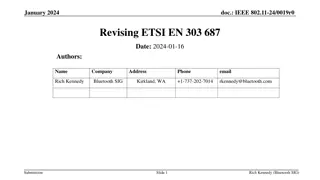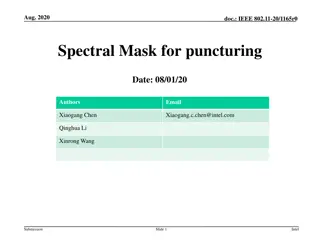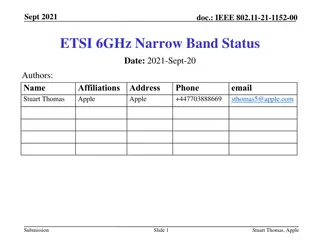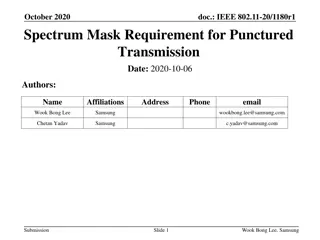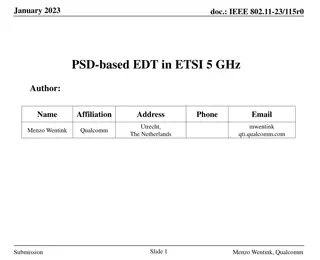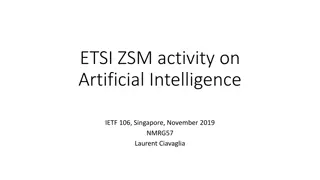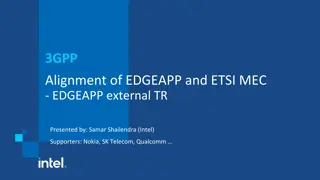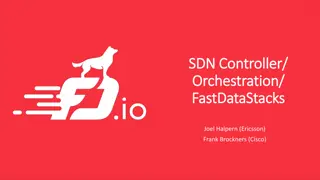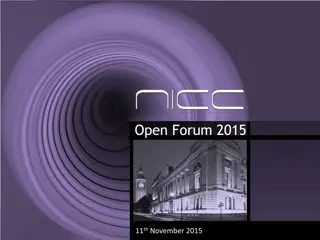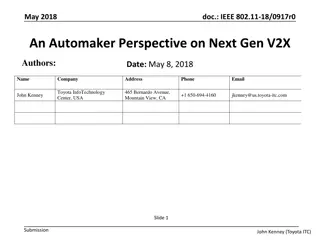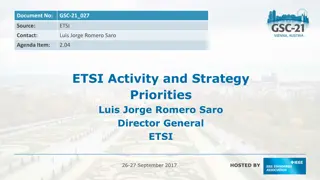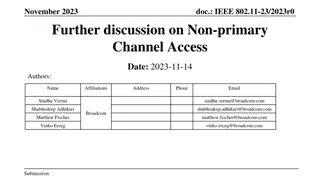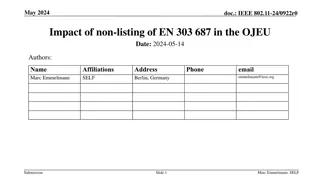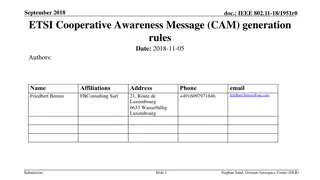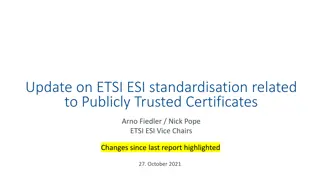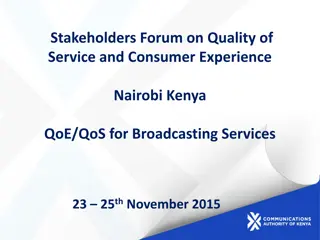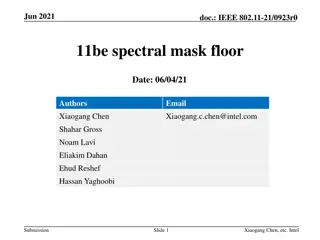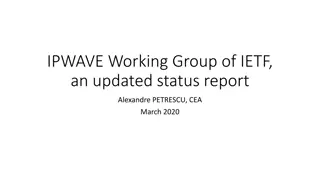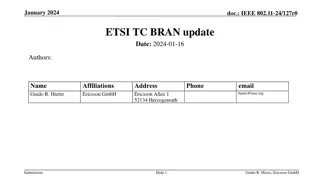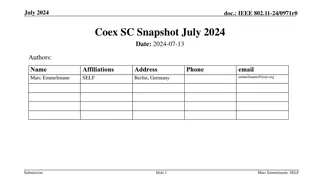Revising ETSI Standard for License-Exempt Operation in 6 GHz Band
Work has commenced on revising the ETSI standard EN 303.687 for license-exempt operation in the 6 GHz band to expedite completion. This revision project outlines the history, New Work Item approval, ETSI processes, and the upcoming steps. It traces back to 2017 when Switzerland and ECC administratio
0 views • 10 slides
Proposal for Reusing ETSI Puncturing Mask in IEEE 802.11be Standard
A proposal is presented in the document IEEE 802.11-20/1165r0 discussing the possibility of reusing the ETSI-defined puncturing mask in the context of the 11be standard. The document highlights the comprehensive nature of the ETSI mask, covering various puncturing cases, and suggests that adopting t
1 views • 12 slides
IEEE 802.11-21-1152-00 ETSI 6GHz Narrow Band Status Updates
Detailed updates on Narrow Band activities from May 2021 until September 2021, focusing on technical submissions, regulatory amendments, and coexistence issues between Narrow Band (NB) and Wide Band (WB) systems. Stuart Thomas from Apple provides insights based on documents and simulations discussed
0 views • 10 slides
Spectrum Mask Requirements in IEEE 802.11 for Punctured Transmission
The document discusses the spectrum mask requirements for punctured transmission in IEEE 802.11 standards, specifically focusing on differences between ETSI and IEEE 802.11ax spectral masks. It covers cases of puncturing scenarios and additional channel edge masks to be applied in different situatio
1 views • 16 slides
PSD-based Energy Detect Threshold (EDT) in ETSI 5 GHz Standard
ETSI BRAN adopted a PSD-based EDT into the 5 GHz standard, specifying thresholds for energy detection levels. The new definition replaces the previous -72 dBm/20 MHz EDT, offering a compromise between power limits and channel configurations. Detailed examples and operational guidelines are provided
0 views • 6 slides
Zero Touch Network and Service Management Architecture Overview
Explore the ETSI ZSM ISG's initiative on Zero Touch Network and Service Management, focusing on creating an automated architecture supporting legacy and virtualized networks. Learn about the framework, architecture features, and services offered within the ZSM domain. Dive into E2E service managemen
0 views • 9 slides
Alignment of EDGEAPP and ETSI MEC for Edge Computing Standards
At a recent joint workshop, 3GPP and ETSI MEC discussed aligning standards to prevent duplication of work and enable interoperability. The collaboration aims to harmonize API definitions, reuse existing specifications, and prioritize normative work for seamless integration. The ultimate goal is to s
0 views • 6 slides
NFV and SDN Controllers in Networking Architecture
This content discusses the architecture and components for designing NFV solutions, including roles of ETSI, OPNFV, ODL, and forwarding in the network. It highlights the coordination needed in deploying NFV in data centers and smaller facilities, emphasizing the use of NFV and SDN controllers to wor
0 views • 16 slides
Emergency Location Working Group Initiatives and Standards
The Emergency Location Working Group focuses on securely providing accurate location information for emergency calls in the UK. They address standards, publications, and current focus areas such as ETSI architecture review and protocols for locating VoIP emergency calls. The group collaborates with
1 views • 6 slides
Automaker Perspective on Next Gen V2X Technology
In May 2018, John Kenney from Toyota Info Technology Center presented on the IEEE 802.11-18/0917r0 document, discussing the importance of interoperability, technology migration implications, and the need for a long and stable operation lifetime in next-generation V2X systems. The presentation highli
0 views • 19 slides
ETSI Long-Term Strategy and Priorities Overview
ETSI's long-term strategy focuses on socio-economic policies and technology advancements to drive digital transformation and innovation. The organization plays a crucial role in shaping ICT standards, engaging with policymakers, and investing in IoT and Smart Cities initiatives. Additionally, ETSI c
0 views • 8 slides
Further Discussion on Non-primary Channel Access in IEEE 802.11
This contribution delves into the utilization of non-primary channels for access in IEEE 802.11 networks, focusing on enhancing frequency reuse, adhering to ETSI standards, evaluating CCA capability types, and analyzing non-ideal deployment scenarios. It discusses the complexity and benefits of non-
0 views • 26 slides
Impact of Non-Listing of EN 303.687 in European Market
Coex SC received an update on ETSI BRAN activities and identified the risk of EN 303.687 not being listed in the OJEU, affecting self-certification process for European market placement. Request for feedback was sent to IEEE staff and 802 Coex SC Chair. Feedback session took place in May 2024 meetin
0 views • 5 slides
IEEE 802.11-18/1951r0 ETSI CAM Generation Rules
ETSI EN 302.637.2 defines the structure and generation rules of Cooperative Awareness Messages (CAMs) for Intelligent Transportation Systems (ITS). CAMs are essential for a variety of ITS use cases and must be backward compatible in NGV systems. The CAM messages are non-deterministic in time and siz
0 views • 7 slides
Updates on ETSI ESI Standardisation for Trust Services
ETSI and CEN standards are evolving to support eIDAS with a focus on publicly trusted certificates and trust service components. Recent changes highlight advancements in identity proofing, signature validation, cryptographic suites, and more. Key drafts and policies provide insights into technologie
0 views • 12 slides
Evolution of QoS/QoE in Broadcasting Services
Consumers and regulators are driving the need for established Quality of Service (QoS) and Quality of Experience (QoE) standards in broadcasting services. Stakeholders in Nairobi discussed the importance of ensuring signal quality, video/audio performance, and transmission metrics to meet subscriber
0 views • 12 slides
IEEE 802.11-21 Spectral Mask Floor Considerations
This document discusses the considerations related to changing the absolute power spectral density (PSD) floor for IEEE 802.11-21 transmissions. It covers requirements from regulatory bodies like ETSI and FCC, as well as considerations for coexistence with technologies like 5GNR. The document also h
0 views • 10 slides
IPWAVE Working Group of IETF - Status Report March 2020
IPWAVE Working Group of IETF focuses on IP Wireless Access in Vehicular Environments, addressing V2V and V2I use cases. Key items include IPv6 over 802.11-OCB and Problem Statement and Use Cases perspectives. The group collaborates with ISO, SAE, ETSI, and IEEE. Major achievements include RFC 8691 p
0 views • 9 slides
ETSI TC BRAN update
This document summarizes key updates and activities from the IEEE 802.11-24/127r0 ETSI TC BRAN meeting in January 2024. It covers the progress made on standards revisions, approval procedures, upcoming meetings, and more.
0 views • 5 slides
NB overview
The document explores the status of VLP NB operation in the 6 GHz band in Europe, focusing on ETSI 6 GHz NB rules and EN 303.687 overview. It delves into spectrum sharing for NB/Wi-Fi coexistence, LBT requirements, and proposed access rules. Additionally, it discusses Wi-Fi/BT coexistence in the 2.4
0 views • 25 slides
Coex SC Snapshot July 2024
Snapshot for the Coexistence Standing Committee meeting in July 2024, including agenda items, discussion topics, and meeting slots for joint sessions. Topics cover Bluetooth updates, ETSI TC BRAN, Narrowband technology, and coexistence with Wi-Fi.
0 views • 4 slides
